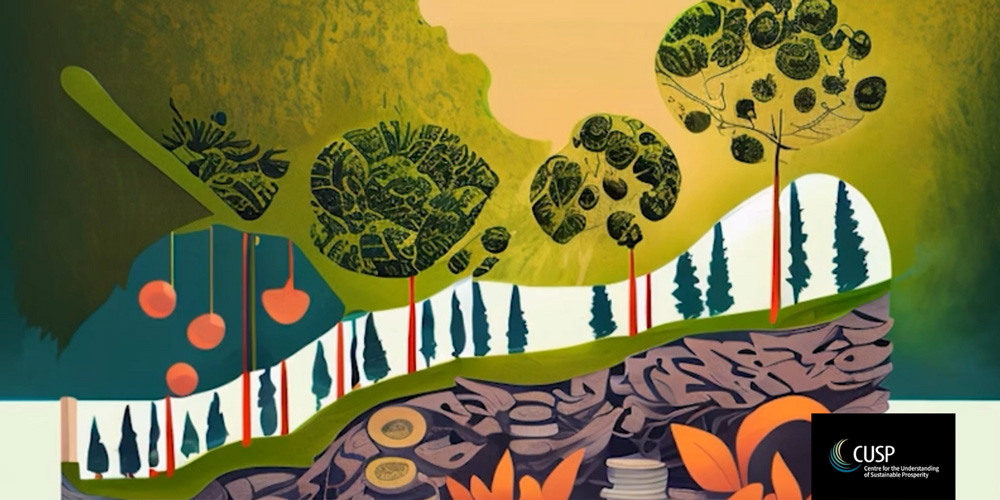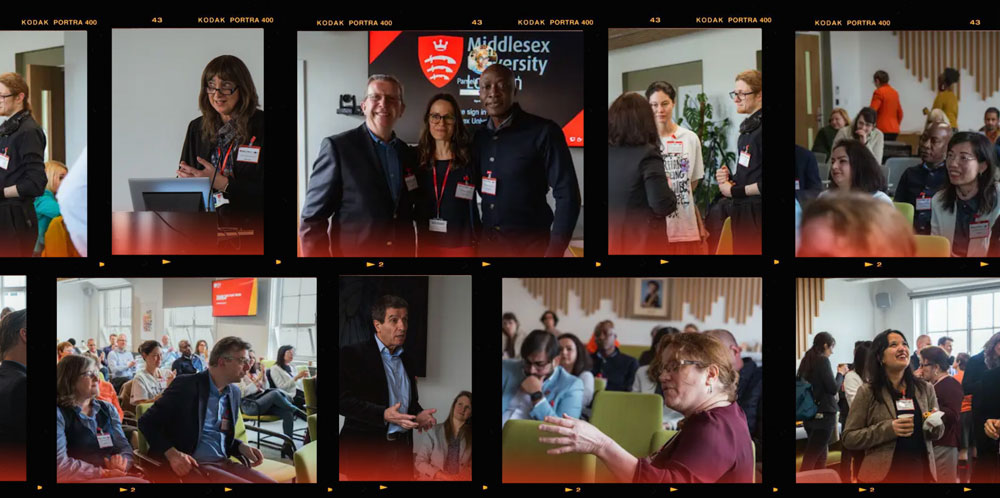How green finance for Small and Medium Enterprises could encourage nature recovery
To tackle the ecological emergency and nature loss, businesses are urged to examine ways to reduce their impacts. However, much of this effort is directed towards large corporations, overlooking the fact that SMEs comprise more than half of the private sector. In this blog, members of the Middlesex University SME Nature Positive Finance project outline how finance for SMEs can play a role in encouraging business sustainability and emphasise the need for a specific government strategy for supporting SME nature positive investment.
Blog by Amy Burnett, Robyn Owen, Fergus Lyon and Andrea Werner

Globally, 15% of terrestrial and freshwater species face extinction and one in six species in the UK is at risk of being irredeemably lost, with biodiversity declining by almost 20% since the 1970s. However, despite the huge dependencies businesses have on nature—also highlighted in the influential 2021 Dasgupta Review of the Economics of Biodiversity—these are not always recognised or measured by business. Globally, less than half of large businesses recognize biodiversity loss as a risk and this figure may be even less for UK Small and Medium-sized Enterprises (SMEs). There are plans for reporting obligations for businesses but the research from our project shows that SMEs need to be considered separately. There are two major reasons for this. First, the vast majority of SMEs are excluded from plans to require businesses to report their environmental impact (see GTAG, April 2023). Second, SMEs face challenges of newness and smallness, with less access to finance and fewer resources than larger businesses, that impinge on their ability to take environmental actions and voluntarily report on their biodiversity and carbon risks.
The lack of reporting on climate risks is alarming, given that data from the British Business Bank (IPSOS, 2021) suggests that SMEs account for half of UK business-related climate emissions. The lack of attention to the role of SMEs in nature recovery is also worrying, considering the UK’s target of leveraging £1 billion per annum until 2030 to drive private sector involvement in nature recovery.
SMEs, if sufficiently financed and resourced, can be agile and provide an innovative source of forward-looking, purposeful alternatives to traditional business practices. Policy support for British SMEs to develop and adopt ‘green’ environmental innovations should therefore be a high priority of the UK government. Indeed, evidence from Middlesex University’s research suggests that UK SMEs can be global leaders in measuring biodiversity and reforming business finance markets.
Our work on SME Nature Positive Finance builds on this ongoing research agenda and explores key high-risk sectors and how SMEs can transition towards an economic system that genuinely prioritises and values nature at the heart of every financial transaction.
Taskforce for Nature-Related Financial Disclosures (TNFD) and SMEs
The recent publication of the recommendations from the Taskforce for Nature-related Financial Disclosures (TNFD) in September 2023 includes several key climate and nature-positive (biodiversity) performance indicators to encourage greater action on nature-driven investment.
However, SMES do not need to report against the TNFD—for them, change towards nature-positive practices is expected to be achieved on a more ‘trickle down’ approach. In fact, SMEs are only mentioned twice in the TNFD recommendations, and further guidance on SMEs is forthcoming. The supplementary guidance to financiers does not mention SMEs, other than referring to small-scale farmers engaged in measuring the supply chain impacts of Reckitt [link to case study 3]. There are also valid concerns in industry on how the TNFD needs to be “defogged” to be relevant and useable for SMEs.
TNFD Recommendations on SMEs
The TNFD guidance and recommendations are also relevant for small and medium-sized enterprises(SMEs). In many cases, SMEs are closer to the source of nature-related dependencies, impacts, risks and opportunities and may have fewer options to diversify their exposure or shift sourcing. Their assessment of nature-related issues will also enable them to respond to nature-related information requests from their suppliers and downstream customers. Nevertheless, the TNFD recognises that some SMEs may need further support in applying the recommendations in a proportionate way to the size of their activities and the resources they have available. In recognition of this, the Taskforce intends to work on additional guidance for SMEs. (TNFD Recommendations, September 2023, P.10). The fact that many organisations—both with public disclosure requirements and small and medium sized enterprises across supply chains—have increased their awareness and capacity to assess the implications of climate change provides a strong platform on which to build (TNFD Recommendations, September 2023, P.14).
Navigating Institutional Support and Policy Gaps for SME Green Finance
While policy can stipulate a need for long-term management, how this is financed is less clear-cut, particularly for SMEs. In the UK, key institutions have been established to support the transition to a green economy, including the Green Finance Institute (GFI). The GFI ‘s remit is to catalyse green investment more generally but, as a philanthropically funded organisation has not yet been mandated or funded to specifically examine the support needed for SMEs. Given the importance of SMEs in the ecosystem, if a government body or philanthropic organisation would like to explore this further, the GFI would be interested in seeing what role they could play in supporting SMEs. Their recent Farming Toolkit for Assessing Nature Market Opportunities explores the issues facing SME farmers and shows how there can be investable propositions from payment for ecosystem services.
The British Business Bank, as per its own description, is a government-owned business development bank dedicated to making finance markets work better for smaller businesses. During our SME Nature Positive Finance conference at Middlesex University in March 2024, Dan van der Schans from the Bank delivered an excellent presentation, emphasising the lack of UK financing for deeptech, hardware, and long-term SME green innovation. Moreover, while the climate-focused British Business Bank is one among several national investors in the green economy—including Innovate UK, the Department for Energy Security and Net Zero, and the Department for Environment, Food, and Rural Affairs—these entities have not yet fully addressed the scope of finance that is needed for nature-positive innovation. Our research tells us that no one organisation is pulling together the SME green innovation financing strategy for the UK which would connect government agencies through a coherent, action-oriented policy implementation programme.
There is the 2023 Green Finance Strategy that seeks to incorporate both nature and climate adaptation into the Government’s green finance policy framework. But the strategy does not have specific recommended actions for supporting SMEs. Furthermore, mention of SMEs tends to be predominantly in the context of net-zero. The UK’s green taxonomy was shaped by the Green Technical Advisory Group (GTAG) but an emphasis on SMEs was not specifically in the GTAG’s remit. While the GTAG’s formal role has ended, several advisory groups continue to explore green finance criteria. For instance, the Land, Nature and Adapted Systems (LNAS) Advisory Group is currently developing recommended sectoral criteria for agriculture, fishing and aquaculture and broader taxonomy criteria for climate change adaptation (which explicitly relates to the agri-food dimensions of our project).
It is fair to say, that SMEs receive very little institutional support on their route to accessing green finance. A few attempts to address this gap are: a toolkit produced by the CBI in 2021 (with focus mainly on climate change, plugging particular financial providers), the Green Finance Institute’s Farming Toolkit For Assessing Nature Market Opportunities and a toolkit produced by the Middlesex University research team in an early phase of this project which aimed to support investors and SMEs on measuring their environmental impact.

A call for a roadmap for SMEs nature-positive investment and reporting
Investment in SMEs must transcend mere climate considerations and move beyond exclusive focus on larger corporations to effectively address this challenge (moving beyond a lighter shade of green or what Dr Jan Konietzko has termed ‘carbon tunnel vision’). Big business does not work in isolation from smaller businesses. We call for the development of an SME roadmap—urgently.
We want to partner with the organisations that have done a fantastic job of promoting climate action to drive efforts in supporting SMEs to transition to nature-positive practices. The absence of significant ‘scale-up’ investment in the UK to encourage nature-positive innovation and investment must be addressed. Without this change, can we truly consider ‘green finance’ as genuinely green? To quote Nick Lyth from Green Angel Syndicate (GAS) at our recent SME Nature-Positive Finance Conference: “We need clearer messages and understanding of these issues to ‘market’ the required transition change.”
For the SME Nature Positive Finance Roadmap, we recommend:
- An overarching strategic body for UK SME green finance that can deliver a coherent roadmap for SME green finance—particularly for green SME innovation. UK SME innovation is impressive but there are gaps between investment supply and demand: public policy can enable more integrated finance where departments and key agencies come together to solve green finance investor needs along the finance escalator from seed R&D to commercial scaleup.
- All finance should have green principles, particularly public finance. However, there is also a need for targeted public finance to meet the needs of SME green innovation and this requires supporting specialist green private sector financiers to leverage more private funding, notably into scale-up commercialisation.
- Finance from larger businesses can shape the greening of SMEs in their supply chain. At the moment this is only advocated by some more advanced public and early-stage investors and there is a need for guidance for intermediate green supply-chain investment.
- Support collaborative green innovation to deliver faster, more effective environmental risk assessment in the UK and global financial markets. Green tech is lowering the cost of biodiversity monitoring and will make reporting more affordable for SMEs. Examples of this include making existing data accessible and by monitoring wildlife by searching for their eDNA in water or soil (for example NatureMetrics who also gave an excellent presentation in our March 2024 conference and panel discussion). However, many other complementary innovative services can also capture data which can enable data integration and more effective machine learning through a positive approach to collaborative science. Such complementarity can also support a strong role for citizen science and the empowerment of communities, landowners, SMEs, financiers and all of us as ecological citizens, bestowed with both responsibility for our shared planet and equipped with the tools to measure our impact on nature.
With thanks to Amy Allan from the GFI who provided helpful comments in the preparation of this blog.
About the project
Funded by UKRI and the Natural Environment Research Council (NERC), the broad aim of this project is to explore SME finance markets in four high-risk environmental impact sectors: agrifood, infrastructure, sustainable fashion and ecological measurement services. The project is part of the Integrating Finance and Biodiversity for a Nature Positive Future programme, a £7milion programme co-led by NERC and Innovate UK to develop the solutions needed to embed the values of biodiversity in financial decision-making. For more information see Integrating Finance and Biodiversity | Nature positive future (infinbio.org).
Links
- The project team recently held a conference for practitioners and policy makers to discuss current research findings. For outputs from the event, please see the dedicated event page.
- To learn more about the research programme, please see the project page.



